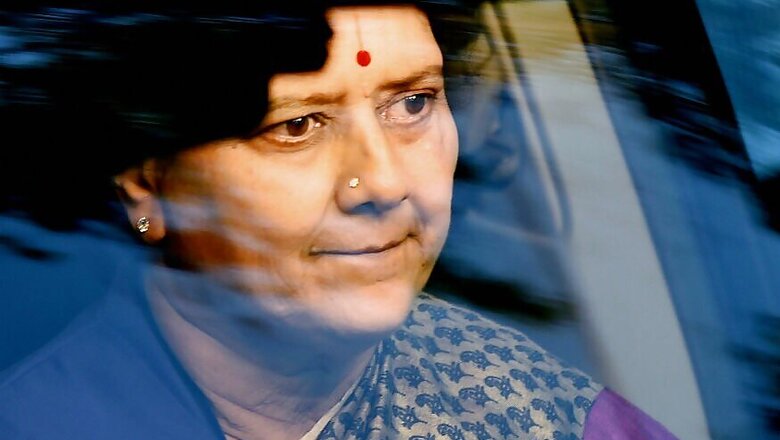
views
The Supreme Court will on Tuesday pronounce the verdict on the 18-year-old disproportionate assets case that had haunted the late J Jayalalithaa for a good part of her political career. The former Tamil Nadu chief minister is no more, but in the dock, is the future Tamil Nadu CM VK Sasikala who is ready with her band of MLAs to swear-in as the next Chief Minister of Tamil Nadu. News18 puts together the other legal challenges facing her and possible outcomes of the verdict which is expected any moment from now.
BV Acharya, who was a senior counsel and former advocate general of Karnataka during this case, had told News18.com, “When there is only one accused, then in the event of the person’s death the judgment is usually abated. But in this case, there were more than one accused and even if Jayalalithaa’s name would be struck off, Sasikala and others are still very much in the case and could be convicted again.”
He maintains that the order of Jayalalithaa’s acquittal by the Karnataka High Court was wrong and was without any merit. “The error was apparent when even hen the lawyers of the accused only commented on the conclusive paragraph of the judgment without delving into the reasoning given by the judges,” Acharya said.
Acharya said that if the apex court rules in favour of the prosecution, then not only could Sasikala and others land in jail paying a fine, but there would also be an order of confiscation of properties by the government.
Since the SC has hinted towards the pronouncement of the verdict within a week, it would probably be announced after February 9 the day when Sasikala is officially expected to take over as the Chief Minister. In an event of her being convicted of the offences, then as mandated by a 2013 SC verdict on Representation of the People Act that prevents member of the state legislative assemblies and members of parliament from holding the posts after conviction, Sasikala would have to step down as the Chief Minister.
Apart from this DA case, what are the other cases against soon to be Tamil Nadu CM VN Sasikala?
There were 3 cases filed by the Enforcement Directorate in 1995 & 1996 where she has been charged with violating Foreign Exchange Regulation Act (FERA). The cases were related to payments made to foreign firms in US & Singapore dollars for hiring uplink facilities for JJ TV, the predecessor to Jaya TV. On Feb 1 this year the Madras HC refused to discharge her in these cases.
Another case relating to acquiring illegal foreign exchange through an acquaintance in Malaysia is also pending against her. Sasikala along with her sister-in-law J. Ilavarasi allegedly used the money to purchase the Kodanad Tea Estate in the Nilgiris. In May 2015, Egmore court had discharged her from the case but Madras HC directed her to face trial following criminal revision petition filed by the Enforcement Directorate.
With a two-judge bench deciding the fate of Sasikala and her close aides, is there a possibility of a ‘split verdict’?
A two-judge bench is a case which is being decided by two judges. In the SC, apart from a two-judge bench, the rest of the benches are generally composed of odd number of judges. Now there have been instances when the two judges have penned down separate judgments which do not give a similar verdict, where one judge finds the accused guilty and the other finds him innocent. This situation is known as delivering a ‘hung verdict’. In such a case the matter is further referred to a three-judge bench. This involves a fresh round of hearings and submission of evidences. In this case, Sasikala could be sworn in as the Chief Minister immediately as the outcome will at least take another year. In this case, the hearing started on Feb 23, 2016 and ended on June, 2016, and the verdict was reserved for another eight months.
But Article 164(4) of the Indian Constitution has to be used to usher her into power. This is a provision which reads as, “A Minister who for any period of six consecutive months is not a member of the Legislature of the State shall at the expiration of that period cease to be a Minister.” This gives Sasikala a time period of six months to become a member of the legislature of the state. But there exists a SC judgment known as the BK Kapoor case which allows a non-elected member over any other leader only in case of ‘political exigencies’ or ‘in certain exigencies like the need for an expert to be brought in.’
Can the matter be referred back to the Karnataka High Court for consideration?
Yes, there is a possibility. To understand whether the matter stands a chance to be referred back to Karnataka High Court has to be on the basis on evidence. During the hearing in this case, the SC had asked the Karnataka government an important question that whether it could prove that the money circulated among the co-accused was of Jayalalithaa. During this juncture, Jayalalithaa’s lawyer, had submitted that just because the co-accused lived with her it cannot be presumed that their (Sasikala) assets were out of Jaya’s wealth. The bench had also remarked, “Disproportionate assets is not a crime. It is only a crime if it is proved that the source of the money is illegal.”
The finest argument which could save the day for Sasikala would be that assessment of the assets individually for the co-accused was not a point of consideration for the lower court which held them guilty of the offence. Question also arises as to whether Karnataka government had been able to submit evidences showcasing exactly the amount of wealth earned by Sasikala apart from being linked to that of Jayalalithaa. This would then involve the process of determining whether the wealth earned is legal or not.
The recent discharge of the Maran brothers in the Aircel-Maxis case also shows judicial tendency in this regard. It was this question which helped them get discharged where the court said, “perception or suspicion are not enough for criminal prosecution.”
What are the other possible outcomes?
There are two other possible outcomes which is like black and white. If the bench upholds the High Court verdict, then the order of acquittal gains the seal of the Apex court resulting in disqualification for Sasikala. This also clears her much-tainted image which could have been a hindrance in her being sworn in as the CM. Now the deck would be cleared.
But if the bench upholds the trial court verdict which found them guilty. The court will also then have to accept that High court verdict had erred mathematically while calculating the sum of the disproportionate asset. This results in Sasikala’s CM dream falling apart like a pack of cards. Sasikala stands convicted again and disqualified for 10 years. The court could also take over the properties in question and hear legal claims to such properties and grant them compensation in lieu of such properties.




















Comments
0 comment